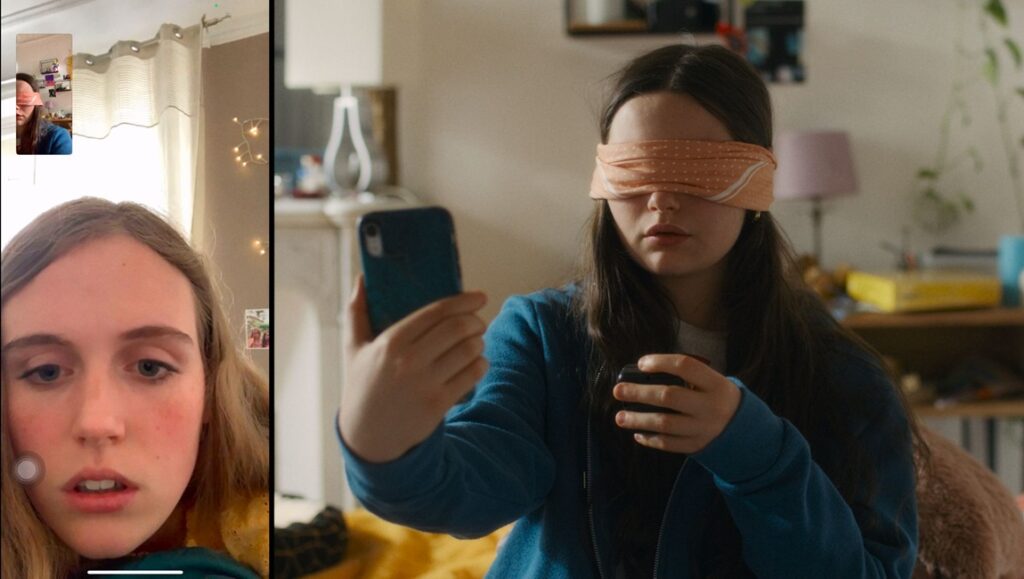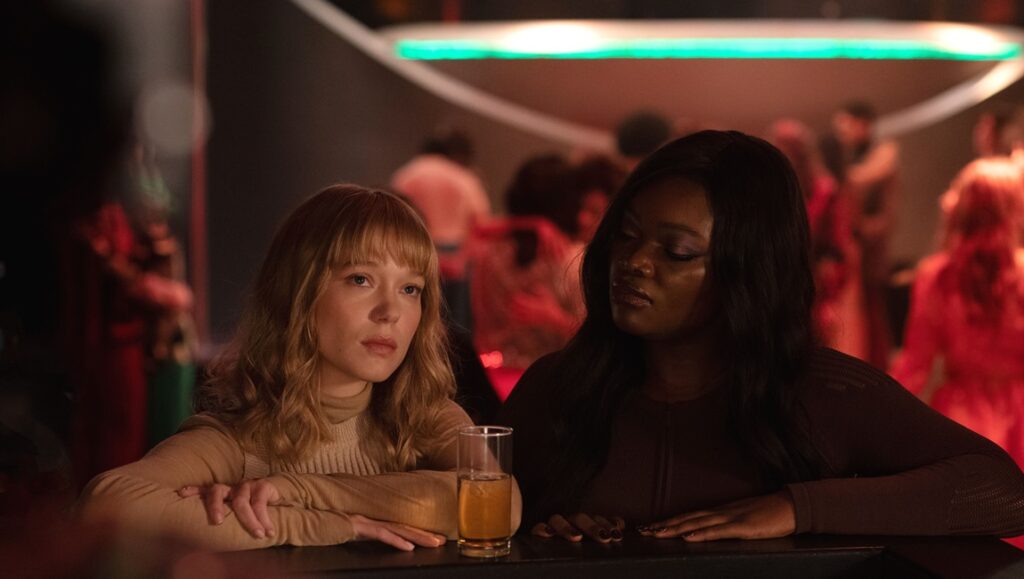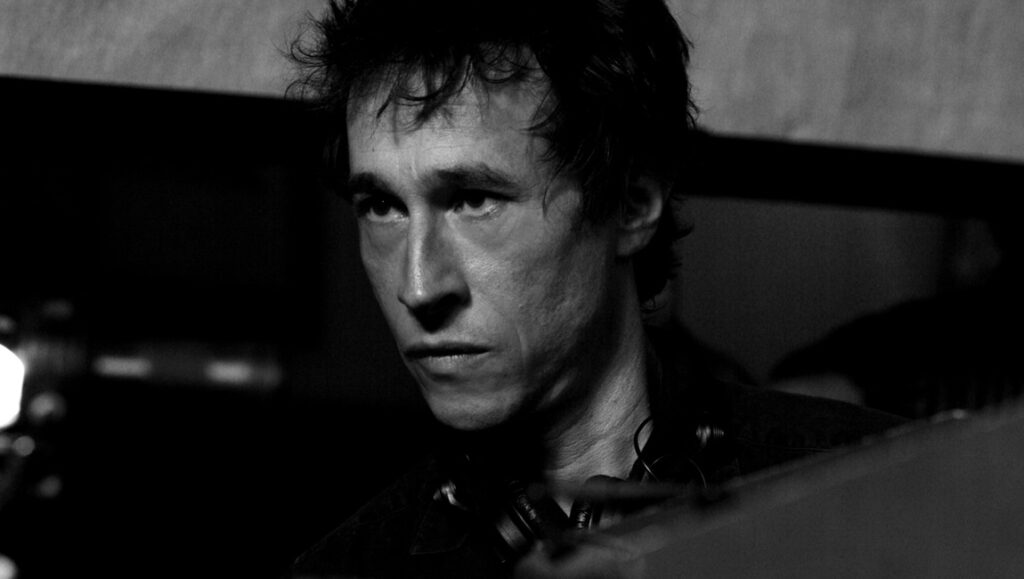Your films have been widely described as having thematic preoccupations with the future and its anxieties, but at the same time they also are imbued with a very potent sense of the romantic. Even Nocturama, a film which ends in guns and fury, doesn’t quite fit the mold of cynicism. Do you see your films as wrestling between delineating the world to come and remembering the world left behind?
Well, first, I’m not cynical at all! And romantic, yes, of course, there is a lot of romanticism even in Nocturama, and that’s why I picked young people for the film, because if you were like 30 years old it doesn’t mean the same thing. But as they were between 15 and 21, you still have this kind of romanticism and idealism. And even if I do period films I try to make them as contemporary as I can, to think about today, and thinking about today is also thinking about yesterday and the future. I’m not regretting anything, but of course there is a kind of melancholy about things that have disappeared. For example, House of Tolerance is about the end of a period — the end of the 19th century — it’s something that dies and ends. Saint Laurent, it’s about the end of the ’70s, something that dies and ends. And I think the melancholy in my films comes from this, from the souvenirs and the fact that something is dying and will not be reborn or will be, but very differently.
Speaking of beginnings and endings, I just watched The Pornographer a few days ago, and while its focus on the tensions between the old and the new is just as relevant to that film as your later works, it’s also a very different film in some ways because the characters seem resigned to their fates, the silences are louder. Jérémie Renier’s character initially joins a political movement which declares that “we live in joyless times, and it’s also our fault.” That was in 2001. What has changed, in your view, with regard to how the younger generation today views the world, whether through film or through politics?
I’d say that the young people in The Pornographer could be the big brothers of the ones in Nocturama. So in 2001, an idea for revolution could have been to be silent, but in 2016 it’s just wishing to blow everything up, because 15 years have passed and the world has changed so much. But the main question of The Pornographer was mainly what it means to be the son of [someone], politically, cinematically, and intimately. These are the three axes of the film, and this is the question Jérémie Renier [Joseph, the son] asks Jean-Pierre Léaud [Jacques, the father]: how can I exist as a son now, because your generation has done all these things? What is left for us?
How about in 2024? The past eight years alone have seen so much…
Of course, I’m very worried about the future, but I don’t want to be 100% pessimistic. In The Beast, for instance, I used science fiction for the first time, and it’s set in 2044, which is very close to our time. What’s good about science fiction is that you’re creating a world, inventing a world, and you’re talking about your fear of the present — of today. I’m not alone in this of course, but my fear of today is very huge. And that’s how I imagined the future in The Beast.

That’s quite interesting, because one would think that a text by Henry James [The Beast in the Jungle] would be unadaptable for the screen, and yet your film is now at least the fourth feature to have done so. I read your interview with Michael Almereyda where you mentioned the allure of its melodramatic, somewhat apocalyptic subtext. What was the process like drawing inspiration from James’ novella, and was it always in the screenplay to imagine the possibility of recalling — and possibly being rid of — one’s past lives?
It’s a text I’ve read a long time ago — many times; it’s very short — and I really loved it, but never thought of doing a film with it. But when I was thinking about doing something close to melodrama, that drove me back to the text, because I couldn’t find a better argument than Henry James’. It’s just heartbreaking and beautiful. But I realize that the text is even more contemporary now than when it was written because it talks about the sense of catastrophe all the time, and this rings a very contemporary bell for me. There is this amazing idea that something is going to happen, which is great for a film. Because for characters and the audience, something is going to happen, and you don’t know what, you don’t see it, you can’t guess it. But you’re expecting something.
I can see that, because I read the novella last year before watching The Beast, and it’s a really hard text to get through, but as you do so you find that it grows on you subtly, with this sense of impending dread. I wanted to tie this back to the film, specifically its 2014 segment, because your choice of Elliot Rodger as the basis for Louis [George MacKay’s character] was very provocative, and both recordings were frighteningly similar. The thing about Rodger’s anger and his warped perception of the world is that it’s the manifestation of a very contemporary problem: it’s both very specific (about sexual politics) and very general (reflecting a much broader dissatisfaction with the world). How did the idea behind the incel subplot come about?
Yeah, it’s the same words and the same attitude and the same framing (on the iPhone). But The Beast in the Jungle, the novel, is really about the fear of love, so in 1910 it’s very obvious that Gabrielle has this fear. And I was trying to explore this idea once again in the contemporary world, and the incels, what do they say? They say, okay, no woman wants me, so I hate them, so I’m gonna kill them. But there might be something they do not say because they’re not conscious of it, and it’s this: I’m afraid of love, so no woman wants me, so I hate them, so I kill them. For me this is a very contemporary way to think about the fear of love. And it drove me back to these videos I saw 10 years ago — I remembered them clearly.
You’re one of the few contemporary filmmakers who set their films explicitly in the contemporary. This thing about incels is a very new phenomenon and you are not afraid to tackle it, and you do so in a sharp and perceptive way.
[Laughs]
You have said elsewhere that The Beast is something like a culmination of all of your other films, stylistically and thematically. It’s probably also the most ambitious one you’ve made. Looking back at all the films you’ve made, how has your relationship with filmmaking changed, and would you say the anxieties and fears of our contemporary world have become more pronounced in your work?
Well, yeah, of course your way of thinking about and making films changes with the films. When I started, I never went to [film] school, I was not an assistant, I was very innocent, very naïve, which is great and bad at the same time. Now, of course, I know many things, and it’s getting in a way harder and harder, because you try to be innocent again, to find some really new things, stuff you’ve never done before, but it’s getting harder. So while I’ve gotten more skilled, it’s not always good.
Such is the price of knowledge. Once you know more things…
Exactly. It’s nice to be innocent sometimes.

Watching your film Coma, I felt this — I would say — yearning for optimism; the ending was almost a plea for optimism. It’s a letter from you to your daughter, and despite all the anxiety and the madness of the pandemic coursing through the film, you still try to end on a hopeful note, to ground it in the realm of possibility.
Yeah, Coma was my ninth feature, but in a way it felt like my first. I did it exactly like how I did my first — very small crew, a lot of innocence and fun, really like a first film. We didn’t get funding before making the film, we didn’t have to explain what we were doing. I wrote, I shot, I edited, and then I secured funding after it was finished. So it’s a very different way of filmmaking, and I think I really needed that, needed to find this spirit back, when I did this film. I felt very free.
Did the pandemic have any bearing on how you wanted to tell the story of Gabrielle and Louis? I know that between the inception of The Beast and its realization you made Coma, and that Gaspard Ulliel [the actor originally slated to play Louis] tragically passed. Were there specific elements that you drew from both the lockdown and the making of Coma?
Well, The Beast was written before the pandemic, and at one point the film was postponed because of Léa’s [Seydoux] schedule, and we decided to use the time between then and the shoot to do something. So I think there is some relationship between Coma and The Beast, because I was ready to shoot The Beast then. Of course, the subjects are very different, but the kind of mental trip, the mixing of different types of images, all of these came from [my plans for] The Beast, and I developed them a little further in Coma, and with more freedom. Coma was inspired by the lockdown, but that wasn’t actually so important. It was much more about what it’s like to be 18 — in today’s world.
Some of your shots in Coma — well, in most of your films — have a very oneiric quality to them, and it can be hard to distinguish between what’s real and what isn’t. Out of curiosity, do you ever take inspiration from your dreams, and do you dream like your films?
[Laughs]
Unfortunately, I do not remember my dreams. It’s a big frustration, but I like to daydream or, well, nightdream while awake. Put some music on, let the ideas come while I’m alone in the dark. I can do that for ages. And a lot of my ideas come from that.
So music has a huge influence on the images in your head, how you begin to shape them into a film.
Yeah — I really need and use music for that.
You’re an audiophile as well as a cinephile. I hate to use this word, but do you have a kind of Pinterest, or mood board, when it comes to what you listen to? Songs for specific moments, or really just about anything anytime?
Nope, never anything like that, it’s really a mix. When I write a script, I also make a mood board with some images which I send to the D.P., but otherwise it’s just as it comes.
The ending of The Beast is especially poignant, not least with reference to Laura Palmer’s scream at the end of Twin Peaks: The Return. It’s clear that the price of comfort is the ability to feel, that one has to forget in order to forgive, and we might draw parallels to what some have pointed out as the re-emergence of moralism and a fear of ambiguity in art today. How do you see this trend playing out, especially in France?
Yeah, if I think about French cinema I feel quite lonely sometimes, in the way I think about films, in what I’m searching for, the kind of risks I like to take, because if you don’t take any risks you can’t really find any beauty. I think that Coma, even without a big budget, is the one where I took many narrative risks, because it’s all inside the head of a young girl, but it’s very easy to understand at the same time since you can play with all these different worlds when everything is inside your head. It’s like writing a piece of music in a way.

That’s true. And not only has the subject of cinema changed today, but also the medium of cinema has changed with new technologies and modes of viewing — we now have AI, for instance. Would you ever consider using AI in your films?
I think the question is not about using or not using something, but why and how. I mean, AI is everything, it’s like a computer, it’s like a camera, it’s a tool. And you have to be the master of the tool. So if I am the master of the tool, I can use anything I need, but if the tool becomes the master that becomes a real problem. And I guess that’s the biggest fear I have about AI, you know — not being able to control it.
Yeah, I completely agree. Most people today, when they talk about using AI, treat it as a mere means to an end.
Exactly.
You adapted a novella — by Henry James no less! — into a movie. Are there any other books that you’re interested in putting to the screen?
Not at the moment, no. I’m searching through my personal collection, but at the moment nothing so far.
Would you ever consider making a full-blown horror film? I know you made Zombi Child, which is probably the closest you’ve gotten to that, but something in the vein of monsters, demons, giallo…?
I prefer to put some horror elements, or elements of various genres, into a classical film rather than doing a film that adheres strictly to genre codes. I definitely prefer to mix things — I think it’s more disturbing this way than when it’s a 100% horror film.
Any plans for a new film or music project right now? I know you staged a performance of Schoenberg in Paris earlier this year.
Yes, yes I did.
How was it?
It went very well. There will be a film in there.
There will be a film in there?
Yep. But otherwise, I’m taking notes on different projects, but I’m not sure about those yet. The Beast has been a lot of work, and I feel a little empty right now, and I need to get myself back again.


Comments are closed.